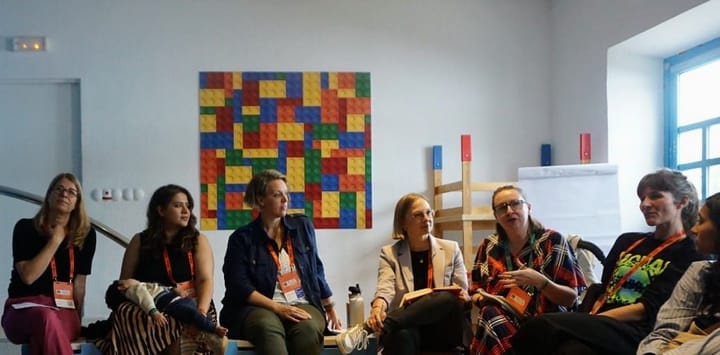Why Feminists Must Defend Encryption
The debate over encryption is often reduced to a false choice between online safety and privacy, but the reality is far more complex.

By Mallory Knodel
The debate over encryption is more than a tradeoff between online safety and privacy, but it is often framed as such. In a new briefing on encryption and online gender-based violence, coauthored by myself and Chayn’s Hera Hussain, we highlight how public debates are too often dominated by law enforcement and victim narratives, overlooking survivors’ needs and feminist perspectives.
As governments advance proposals to weaken encryption in the name of child safety, it’s urgent to center the voices of women, queer people, and gender minorities who rely on secure communication to seek help, organize, and live freely. Our briefing reframes encryption not as an obstacle to safety, but as a lifeline for survivors of online gender-based violence, one that protects privacy and free expression while advancing women’s and LGBTQIA+ rights and safeguarding vulnerable communities. Below is a summary of the full briefing, which you can find here. If you want to keep the discussion going, join us for our MozFest session, details are below this article.
Reframing the Debate
For hundreds of years, women have faced patriarchal barriers to education, art, science, business, housing, and autonomy in marriage and motherhood. These freedoms have been controlled by their fathers, brothers, husbands, sons and government officials in male-dominated systems. To protect themselves, women have often chosen to be anonymous, or had anonymity imposed on them. For gender minorities, hiding their gender identity can provide a safer way to explore their sexuality and relationships.
Public debate about encryption is often reduced to binary narratives that pit child protection against privacy. Law enforcement and some child protection advocates argue that encryption shields abusers and obstructs investigations, while privacy and digital rights defenders counter that weakening encryption endangers everyone. This framing frames “victims” against “privacy advocates” and leaves little room for nuance.What is missing is the perspective of survivors themselves. Women, queer people, gender minorities, and other at-risk communities rely on encryption as a shield against surveillance, harassment, and retaliation. For them, encrypted communication is not an abstract principle, it is a condition of safety, dignity, and freedom online.
Key Arguments from the Briefing
The briefing makes the case that encryption is not a barrier to safety, but a foundation for human rights and survivor protection. It highlights a set of core arguments that reframe the debate and point toward more effective solutions.
- Encryption protects all human rights: It safeguards privacy, security, freedom of expression, and access to information. These rights are recognised in international human rights law, including Article 12 of the UN’s Universal Declaration of Human Rights, which states that “No one shall be subjected to arbitrary interference with [their] privacy, family, home or correspondence, nor to attacks upon [their] honour and reputation." They are also reinforced in the International Covenant on Civil and Political Rights.
- Encryption protects survivors: It is a lifeline for people experiencing intimate partner violence, stalking, or state repression, and for those seeking reproductive health care in hostile environments. Secure communication allows them to reach out for help without fear of retaliation.
- Encryption enables full lives: Survivors are more than the harm they have experienced. Encryption and anonymity allow them to live fully: to learn, to voice opinions, create, form relationships, voice opinions and seek support without constant surveillance or fear of retaliation. For example, in countries where domestic violence is minimized or silenced, safe communications are a lifeline: shelters such as the National Shelter Movement of South Africa, the Women Safe House in Nigeria, and AlertGBV in Cameroon rely on WhatsApp to connect with women in danger. Weakening encryption would strip away these protections, exposing survivors, activists, and dissidents to greater harm than the harm posed by those who exploit it.
- Encryption defends rights: Reproductive rights are an area where encryption, state surveillance and bodily autonomy collide in the most lethal ways. In 2022, unencrypted Facebook messages were used to prosecute a Nebraska teenager and her mother for seeking abortion pills, leading to prison sentences. In the years since Roe fell, abortion-related lawsuits and prosecutions have escalated dramatically, underscoring how dangerous it can be for healthcare providers as well as healthcare seekers when the State apparatus turns against you and the urgent need for safe, encrypted communication.
- Failure to access information costs lives: Encryption is a lifeline in contexts of repression. In Latin America and the Caribbean, an estimated 3.7 million unsafe abortions take place each year, leading to the deaths of nearly 4,000 people. Encrypted tools such as Aya Contigo provide abortion-related information and services while protecting users in Venezuela from state surveillance. Abortion rights are far from the only area where encryption protects people from state repression. A 2023 report by Human Rights Watch found that security forces in Egypt, Iraq, Jordan, Lebanon, and Tunisia targeted queer communities based on their social media and dating app activity, resulting in prosecution, torture, and other offline abuses.
- Alternatives exist: Weakening encryption is not the answer. Safer approaches include developing content moderation tools that work within encrypted systems, strengthening public institutions that support survivors, investing in prevention through education and safety-by-design, and disrupting the financial networks that enable abuse.
The Feminist Response
We believe that the feminist response is to defend encryption because it protects human rights, especially for women, girls, and gender-diverse people at risk of surveillance, abuse, and repression. To reject binary narratives that pit child protection against privacy, and to challenge tech and policy decisions that ignore the lived experiences of survivors.
Feminists working in tech, policy, and frontline services have been clear: privacy is not a privilege, it’s a necessity. It enables people to ask for help, avoid retaliation, and seek information safely. It protects activists and journalists. It shields people fleeing domestic violence. It allows LGBTQ+ youth to come out on their own terms. Survivors shouldn’t have to choose between their safety and their right to be online and communicate privately.
- Survivor-centered groups have built tools and guidance to support this reality. The National Network to End Domestic Violence (NNEDV) and Tech Safety published encryption basics for programs serving survivors of gender-based violence, because secure communication can be the difference between reaching out and staying silent.
- Feminist technologists are also shaping internet standards to protect people from harm. Work at the IETF on unwanted Bluetooth tracking devices emerged from concerns about stalkerware and coercive control. Civil society, including CDT and NNEDV, pushed for cross-platform protections now being implemented by Apple and Google.
- At the infrastructure level, the IEEE 2987 standard is an early but important step in codifying technology-assisted responses to GBV, combining technical expertise with survivor-informed practices.
The call to action here is that feminist technologists can and should show up to these decision making spaces with their unique competencies and expertise to put forward technical designs that go beyond keeping vulnerable communities safe: feminist technology is for everyone.
Why This Matters for Policymakers and the Public
Weakening encryption undermines more than privacy. It destabilizes the entire human rights framework. For survivors, queer communities, and other at-risk groups, secure communication can mean the difference between safety and silence.
Encryption is also a democratic safeguard, restoring boundaries between individuals and institutions. Surveillance-driven solutions may promise safety, but they expose survivors to greater harm and ignore systemic failures. A survivor-centered, rights-based approach shows that protecting encryption is not a tradeoff but the most effective way to uphold dignity, freedom, and security for all.
We should also remember that children’s rights include privacy. Encryption protects them today and safeguards the adults they will become, enabling dissent, activism, and security in the future.
Encryption and Feminism: Reimagining Child Safety Without Surveillance
Continue the conversation about encryption as a feminist issue with IX at MozFest in Barcelona: November 8, 2025 at 13:30 CET.
Our session, with speakers including Chayn’s Hera Hussain, Superbloom’s Georgia Bullen, and IX's Mallory Knodel, will explore how current narratives around “child safety” are being used to justify surveillance and weaken encryption, and how feminist approaches to care, autonomy, and dignity can help us imagine alternative models.
Together with audience voices, we’ll co-create emerging Feminist Principles for Encryption & Child Safety.
Support the Internet Exchange
If you find our emails useful, consider becoming a paid subscriber! You'll get access to our members-only Signal community where we share ideas, discuss upcoming topics, and exchange links. Paid subscribers can also leave comments on posts and enjoy a warm, fuzzy feeling.
Not ready for a long-term commitment? You can always leave us a tip.
From the Group Chat 👥 💬
This week in the group chat, we talked about...
The Danish Minister of Justice and chief architect of the current Chat Control proposal, Peter Hummelgaard, said the quiet part out-loud: “We must break with the totally erroneous perception that it is everyone’s civil liberty to communicate on encrypted messaging services.”
If you’re in Europe, Fight Chat Control invites you to share your thoughts about the "Chat Control" proposal with your MEP. On their site, you can see which states are backing the proposal and how to contact your representatives. https://fightchatcontrol.eu
If Hummelgaard gets his wish, make sure to say “hello” to your friendly Europol officer every time you send an “encrypted” message, just in case they’re reading along.
Want to join our group chat? Become a paid subscriber.
This Week's Links
Open Social Web
- How did you join the Fediverse? One of the important projects for the Social Web Foundation is developing a Fediverse Starter page, helping people get onto the social web. As part of this work, we are conducting user interviews with current Fediverse users to get to know how they joined up and what their experience has been so far. Get in touch if you’d like to be interviewed: https://socialwebfoundation.org/2025/09/10/how-did-you-join-the-fediverse
Internet Governance
- W3C has released a draft Digital Credentials API that lets browsers handle digital IDs with user consent, encrypted responses, selective disclosure, and safeguards against misuse. https://www.w3.org/TR/digital-credentials
- The US should amend the CLOUD Act to block the UK’s efforts to weaken Apple’s encryption and protect global privacy, argue Bob Goodlatte and Greg Nojeim. https://www.techpolicy.press/leverage-the-cloud-act-to-protect-encryption
- While some US politicians have recently characterized European platform and social media regulation laws as “censorship” of speech, this isn't true argues Daphne Keller, an Internet law expert with a twenty-year history of resisting cross-border internet speech suppression demands. https://cyberlaw.stanford.edu/about/people/daphne-keller
- Brazil’s new AI strategy reveals a political battle between Big Tech, industry, and civil society, with labor rights sidelined in the race for digital sovereignty. https://bristoluniversitypressdigital.com/view/journals/gpe/aop/article-10.1332-26352257Y2025D000000037/article-10.1332-26352257Y2025D000000037.xml
- Keep up with the latest on the Geedge & MESA Leak, the largest-ever Great Firewall document dump, with over 500 GB of source code and internal records available for download and analysis. https://gfw.report/blog/geedge_and_mesa_leak
Digital Rights
- The UN Commission of Inquiry finds “direct evidence of genocidal intent” in Israel’s actions in Gaza. The report documents mass killings, destruction of infrastructure, and starvation, alongside social media posts from Israeli officials and soldiers that both incite violence and serve as evidence of atrocities. https://www.ohchr.org/sites/default/files/documents/hrbodies/hrcouncil/sessions-regular/session60/advance-version/a-hrc-60-crp-3.pdf
- Police departments testing Axon’s AI tool to draft reports have been quietly disabling safeguards meant to reveal when the reports were written by artificial intelligence. https://www.marketplace.org/episode/2025/09/04/police-depts-are-quietly-disabling-ai-report-safeguards
- Sir Keir Starmer has confirmed for the first time that the government is looking at digital ID as a way to tackle illegal immigration. File under: We told you so. Now that digital ID is on the table for kids, it's coming for literally everyone. https://www.bbc.co.uk/news/articles/c5y5379djl3o
- Clay Higgins sent a letter to Bluesky and other social media sites threatening investigations if they don't censor speech critical of Charlie Kirk. https://bsky.app/profile/esqueer.net/post/3lyyqtzb7ns2m
Technology for Society
- Massive Attack turned a concert into a facial recognition surveillance experiment, scanning the crowd to make creepy art that forces fans to confront the realities of surveillance culture. https://www.gadgetreview.com/massive-attack-turns-concert-into-facial-recognition-surveillance-experiment
- After a “cruel summer” of AI harms, Alondra Nelson argues the US should adopt an Ethical, Legal, and Social Implications (ELSI) model for AI. https://www.science.org/doi/10.1126/science.aeb0393
- A recording of Educating an A(ctivist) Intelligence explores radical AI education as civic protection, echoing Ars Electronica’s call for a “digital immune system” instead of fear. https://www.youtube.com/watch?v=494fkSzBd3A
- Report by ECOS with Open Future finds that data centre expansion risks derailing climate goals and proposes how to fix it. An analysis of the environmental impacts of data centres, the solutions to this, and possible EU policy responses. https://ecostandard.org/publications/data-centres
- Responsible tech is simultaneously maturing and fragmenting, rewarding those who can translate between policy, technical, and business demands to turn governance into shippable, trustworthy products, finds the All Tech Is Human 2025 job market report. https://alltechishuman.org/responsible-technology-workforce-series
- In peddling "AI for Social Good" initiatives, technology companies and philanthropies are suggesting that complex political, historical, and social issues can be reduced to technical problems. But given how today's AI systems work, there is no reason we should believe them – and much reason to be suspicious of their claims, writes former IX contributor Abeba Birhane. https://www.project-syndicate.org/magazine/ai-for-social-good-false-promise-of-technosolutionism-by-abeba-birhane-2025-09
Privacy and Security
- AI chatbots pose greater privacy risks than online tracking because their conversational format encourages people to share more personal details, revealing not just interests but also thought processes, communication styles, and intimate aspects of personality. We should ban AI surveillance while there’s still time, says DuckDuckGo CEO Gabriel Weinberg. https://gabrielweinberg.com/p/ai-surveillance-should-be-banned
- This article uses the Investigatory Powers (Amendment) Act 2024 to show how government surveillance of communications has changed since the original 2016 law, finding that the government has moved from directly intercepting communications to relying more on private companies that control data, devices, and analysis tools. https://www.tandfonline.com/doi/full/10.1080/09615768.2025.2551419#d1e81
- The Swedish VPN provider Mullvad has enhanced WireGuard with a new obfuscation method based on the QUIC protocol to bypass restrictive firewalls. https://www.cnet.com/tech/services-and-software/mullvad-vpn-now-adds-quic-protocol-to-get-around-firewalls-and-censorship
- A new paper from researchers at Northeastern University shows how the convenience of eSIMs hides serious privacy and security risks, from opaque resellers to hidden data routing across jurisdictions, leaving users with far less control than they think. https://www.usenix.org/system/files/usenixsecurity25-motallebighomi.pdf
Upcoming Events
- Let Them Eat Compute: Computer Says Maybe Climate Week Livestream. September 24, 5pm EST. Online. https://luma.com/l7m3nzzn
- #PrivacyCamp25: The draft program is now out! September 30. Online and La Tricoterie, Brussels. https://privacycamp.eu/2025/08/07/privacycamp25-the-draft-programme-is-out-now
- topDNS Best Practice Series: How is DNS Abuse actually measured? October 8, 4pm BST. Online. https://register.gotowebinar.com/register/4755079276624283741
- The Future of Democracy. A high-level two-day conference of leading thinkers, lawmakers, technologists, and advocates to discuss the direct and growing threats to our democracies and basic liberties posed by today’s dominant online communications platforms, the rise of AI, and interference by foreign states. October 15-16, Brussels. https://www.eventbrite.com/e/the-future-of-democracy-tickets-1683592312929?discount=SPEECHANDPOWER
- The Global DPI Summit brings together innovators and policymakers to turn dialogue into action, driving safe and inclusive digital public infrastructure through keynotes, panels, and interactive workshops. November 4-6. Cape Town, SA. https://www.globaldpisummit.org
- FOSS Backstage. Join to learn more about what makes Free and Open Source Software projects flourish! March 16-17. Berlin, Germany. https://26.foss-backstage.de
Careers and Funding Opportunities
- Patagonia: Principal, Head of AI. Ventura, CA. https://careers.patagonia.com/us/en/job/JOB-REQ-10876/Principal-Head-of-AI
- Gates Foundation: AI Fellows. Apply by September 20. Seattle, WA. https://gatesfoundation.wd1.myworkdayjobs.com/en-US/Gates/job/Seattle-WA/AI-Fellows--12-month-LTE--_B021159-1?source=gatesfoundation.org
- Internet Security Research Group: Director of Advancement. Remote US. https://internetsecurityresearchgroup.applytojob.com/apply/AvkVl7VtMR/Director-Of-Advancement
- Jobs for the Future (JFF): Vice President, Center for AI. Boston, DC, Oakland, or Remote US. https://job-boards.greenhouse.io/jobsforthefuture/jobs/8069367002?gh_src=kbXfCo
- CYBERSTAND.eu: 8th Specific Service Procedure (SSP). Pays experts to directly contribute to shaping the technical standards that will implement the EU’s Cyber Resilience Act. Europe. Apply by September 19. https://cyberstand.eu/8th-specific-service-procedure
- Tony Blair Institute for Global Change: Senior Policy Advisor - AI Policy & Governance. London, UK. Apply by October 3. https://www.linkedin.com/jobs/view/4292798851
- BlueDot Impact: Tech Lead. London, UK. https://bluedot.org/join-us/tech-lead
- ICO: Principal Policy Adviser – AI and ADM Code of Practice. Wilmslow, London, Edinburgh, Cardiff or Belfast, UK. https://ico.wd3.myworkdayjobs.com/en-GB/ICO/details/Principal-Policy-Adviser—AI-and-ADM-Code-of-Practice_JR606
- The Nominet DNS Fund seeks to fund open source projects that support the Domain Name System (DNS). International. Apply by October 26. https://nominet.uk/blog/introducing-the-nominet-dns-fund-supporting-the-vital-work-of-the-open-source-community
What did we miss? Please send us a reply or write to editor@exchangepoint.tech.




Comments ()